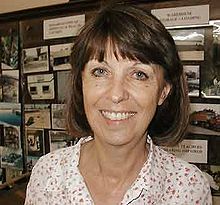Margaret Hassan: A Personal Tale. Felicity Arbuthnot
Freelance journalist Felicity Arbuthnot, a long-time friend of kidnapped aid worker Margaret Hassan, describes the charity boss's heroic endeavours to help the people of Iraq.

[This article was published by the BBC in 2004.]
Even in the bloodshed and turmoil of post-invasion Iraq, the kidnapping of Margaret Hassan, head of Care International in Iraq, is incomprehensible.
Margaret Hassan fell in love with Iraq more than 30 years ago, when she travelled there as a young bride with her Iraqi husband Taheen Ali Hassan.
They had met while studying in London and the former Margaret Fitzsimmons, from Dublin in the “land of a thousand welcomes”, fell in love for a second time with Baghdad – formerly Madinat al Salam: City of Peace – and the land known through time as “the cradle of civilisation”.
She learned Arabic and took Iraqi citizenship.
Terrible Emergency
 She never considered leaving – not during the eight year Iran-Iraq war, the 42-day carpet bombing of the 1991 Gulf war, the 13 years of the grinding deprivation of the United Nations embargo, numerous bombings by Britain and America during those years, or when last year’s invasion became inevitable.
She never considered leaving – not during the eight year Iran-Iraq war, the 42-day carpet bombing of the 1991 Gulf war, the 13 years of the grinding deprivation of the United Nations embargo, numerous bombings by Britain and America during those years, or when last year’s invasion became inevitable.
Instead, she fought for the people and country, of which she had become a part.
She went to the UN in New York in January 2003, briefing the Security Council and UN Agencies that the majority of Iraqis were staggering under the weight of the embargo and the collapse of the infrastructure, due to prohibition of imported parts.
She briefed the British Parliament:
“The Iraqi people are already living through a terrible emergency – they do not have the resources to withstand an additional crisis brought about by military action.”
She could have stayed overseas – but with war inevitable, she returned to Iraq.
I first met Margaret Hassan in early 1992, months after Iraq had been “reduced to a pre-industrial age for a considerable time to come” according to the then special rapporteur to the UN.
Slender, quietly spoken, she had a will and inner core of steel.
The most obstructive official, determined not to acquiesce to any request relating to one of her projects – water, clinic, school and hospital refurbishments – would find on her departure he had given her all she had requested and suggested and agreed to more.
She is a manipulative charmer on behalf of the people of Iraq.
‘Madam Margaret’
It was Iraq’s children who haunted her, she called the children of the embargo “the lost generation.”
Half of Iraq’s population is aged below 15.
Childless herself, to see her cradle infants stricken with Iraq’s myriad of illnesses which have reached epidemic proportions since 1991 – linked to the destruction of water facilities and the chemically toxic and radioactive depleted uranium weapons used – one felt her passion to protect all Iraq’s children as her own.
“There will be a second generation of lost children now,” she told the Independent newspaper’s Robert Fisk despairingly, recently.
I have a memory that encapsulates Margaret and the love she inspired.
We were filming in an area of exceptional deprivation and poverty, not without its criminal element – poverty breeds desperation.
A crowd gathered. On seeing Margaret, thin, stressed faces, broke into wide smiles, children ran and hugged her round the knees chanting:
“Madam Margaret, Madam Margaret…”.
Iraqis protect those who help them, love them, even to their own lives. The kidnappings of aid workers, friendly journalists, bewilder them.
When Margaret was driving to work, she was reportedly flagged down by two men in police uniform, and suspecting nothing, the car stopped.
Her driver and unarmed guard were pulled out and pistol whipped by gunmen who appeared.
Margaret demanded they stop the beating and said she would go with them.
Poignant Demonstration
Her last act before kidnap and this terrible silence was, as always, to defend Iraqis.
The last project Care completed at Margaret’s instigation, was a rehabilitation unit for patients with spinal injuries.
In a poignant demonstration, those patients that could, painstakingly wheeled themselves into the street, held up banners pleading for her release, in support of an honorary Iraqi and Iraq’s quiet, unassuming, determined best friend.
*
Click the share button below to email/forward this article to your friends and colleagues. Follow us on Instagram and Twitter and subscribe to our Telegram Channel. Feel free to repost and share widely Global Research articles.
Global Research’s Holiday Fundraiser
Featured image: Margaret Hassan has worked in Iraq for the past 30 years (Source: BBC)

